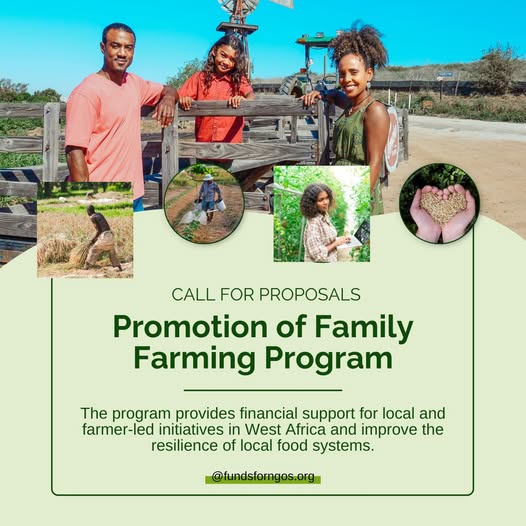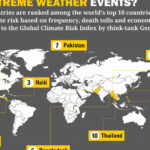
The French Committee for International Solidarity (CFSI) is seeking proposals for the Promotion of Family Farming Program to improve the resilience of local food systems by supporting downstream sustainable local food chains to compete with imported products and the nutrition of the population, including the most vulnerable.
Objectives
- The general objective of the Pafao program is to:
- Promote local initiatives to strengthen access to healthy, quality food, produced by viable and sustainable West African family farming and processed in the country or in the sub-region, while ensuring a fair distribution of added value in the value chains (this is the present call for projects);
- Capitalize (produce knowledge) to draw useful lessons beyond initiatives, for organizations and for advocacy actors. The challenge is to contribute to documentation of the sustainability of this agricultural and food model likely to challenge decision-makers to take these issues into account in public policies;
- Support the construction of scaling strategies so that successful initiatives do not remain marginal but occupy more economic space.
- The program articulates an economic approach with initiatives carried out at territorial and value chain levels, aiming to influence the political and legislative environment on national and regional levels to promote the sustainability of family farming (notably via the alliance with Roppa and several advocacy initiatives).
Priority
- Priority will be given to proposals based on one of the following two approaches:
- accessing major, formalized markets such as contracts with public institutions and businesses (school canteens, prisons, hospitals, hotels, supermarkets, etc.).
- targeting the role of West African consumers and their representative organizations in promoting local consumption.
Challenges
- The program provides financial support for local and farmer-led initiatives in West Africa to respond in a sustainable way to the growing demand of domestic markets, and to ensure a better distribution of added value. These initiatives meet two challenges:
- Strengthen and/or maintain the availability of local quality products from sustainable family farming in rural and urban markets – for mass consumption: How can sustainable family farming continue to supply domestic markets and better satisfy the most vulnerable populations, thereby increasing resilience in the event of a crisis? How can producers, processors, traders and consumers organize themselves to better respond to each other’s needs and benefit from a better distribution of the added value? How can the income generated by family farming strengthen the resilience of actors in the sector in the event of a crisis?
- Developing sustainable farming practices/sustainable food systems: How can family farming adapt to climate change and prepare for future crises (e.g. war in Ukraine and rising input prices in 2022)? How can it contribute to the preservation of natural resources and biodiversity, whether in the production, processing or marketing phases? How can they guarantee the diversification of production and the variety and nutritional quality of local products?
Funding Information
- The minimum contribution from the Pafao Support Fund is 10,000 euros. The maximum amount that can be requested depends on the duration of the submitted initiative.
- The maximum contribution has been set to 20,000 euros for a 12-month initiative, 40,000 euros for a 24-month initiative or 60,000 euros for a 36-month initiative.
Two support Funds
- The Pafao program will have two financial support funds:
- Fund A, which will be used to finance initiatives lasting between 12 and 36 months:
- implemented in the following 16 countries: Benin, Burkina Faso, Cape Verde, Côte d’Ivoire, Gambia, Ghana, Guinea, Guinea-Bissau, Liberia, Mali, Mauritania, Niger, Nigeria, Senegal, Sierra Leone and Togo.
- Fund B, which will be used to finance initiatives lasting between 12 and 23 months and ending no later than 30 November 2026:
- implemented in partnership by a West African organisation and a French organisation;
- implemented in the following 13 countries Benin, Cape Verde, Côte d’Ivoire, Gambia, Ghana, Guinea, Guinea-Bissau, Liberia, Mauritania, Nigeria, Senegal, Sierra Leone, Togo.
- Fund A, which will be used to finance initiatives lasting between 12 and 36 months:
Eligibility Criteria
- This call is only open to initiatives carried out in partnership by a minimum of two organizations, one West African and the other European (must be an EU member state).
- If the initiative leader is a West African organization, then the main partner must be European. Conversely, if the initiative leader is a European organization, then the main partner must be West African.
- The partnership between the two organizations must be formalized and pre-existing to the initiative for which the grant is requested. Other organizations may be involved as “other partners”.
- The applicant must:
- be a non-profit legal entity based in West Africa or Europe (EU), of the following type: farmers’ organization, West African NGO, support NGO active in West Africa or Europe (European Union – EU) as long as it operates with local partners. Cooperatives are also eligible. Public institutions and local authorities are not eligible as applicants;
- have been registered for more than one year;
- have previously carried out actions in the agricultural and food sectors.
- The partner must:
- be a non-profit legal entity of the following type: farmers’ organization, West African NGO, support NGO active in West Africa or Europe (EU) as long as it works with local partners, research and/or training organizations. Cooperatives are also eligible as main partners. Local authorities can be main partners, provided that their role is decisive and clearly explained in the grant application;
- Please note that other public institutions are not eligible as “main partners”, but can be included as “other partners” in the initiative.
- be linked to the applicant by a formal partnership which should have been initiated prior to the initiative for which the grant is requested;
- have participated in defining and implementing the initiative. Their role and added value must be clearly explained. The West African partners of European organizations play a key role in the design and implementation of the proposed initiative.
For more information, visit CFSI.




